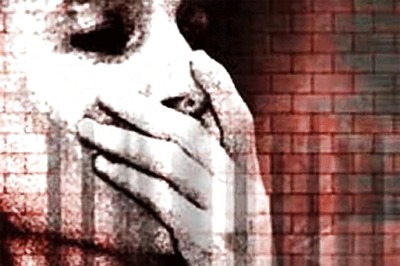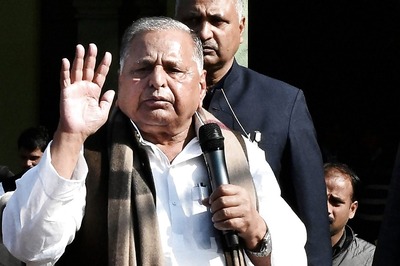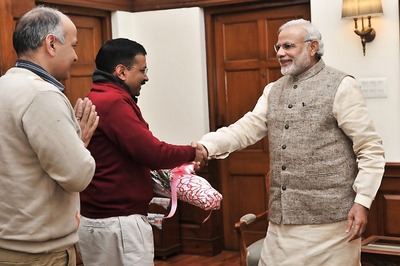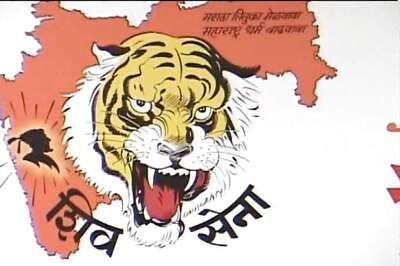
views
Mahatma Gandhi and poet Rabindranath Tagore shared a friendship that blossomed out of reverence for one another. The two great Indians of the 19th century witnessed India at a time of turmoil and led the country towards freedom, trying their best to weave communal harmony into the national fabric despite the 'divide and rule' policy of the British. Gandhi did so with his political thoughts, while Tagore through his writings.
There were several issues on which Tagore and Gandhi did not see eye to eye, but they always found ways to understand each other, even when they didn't agree with one another. Tagore and Gandhi formed a rare bond of fellowship through their epistolary communications that began with Gandhi's first stayed at Tagore's institution, Shantiniketan, in 1915 and lasted till Tagore breathed his last in 1941.
Tagore never got the opportunity to live a day in Independent India, but he shared the same hopes as Gandhi did for India's future: They both dreamt of a nation with communal harmony. Through a new book, titled Friendships of 'Largeness and Freedom' Andrews, Tagore, and Gandhi: An Epistolary Account, 1912-1940 edited by Uma Das Gupta, we get a rare look into the letter correspondence between the three individuals, Mahatma Gandhi, Rabindranath Tagore, and Charles Freer Andrews from the Church of England missionary which gives us a glimpse into the constant fear and anxiety that these men faced, as they saw communal discord slowly creep into the country, before Independence arrived.
In a letter written to Gandhi by Tagore, on September 30 1932, the poet wrote:
Mahatmaji,
Our people are wonderstruck at the impossible being made possible in these few days and there is a universal feeling of immense relief at your being saved for us. Now is the opportune moment when a definite command from you will rouse the Hindu community to make a desperate effort to win over the Mahomedans to our common cause. It is more difficult of success than your fight against untouchability, for there is a deep-rooted antipathy against the Muslims in most of our people and they also have not much love for ourselves. But you know how to move the hearts of those that are obdurate, and only, I am sure, have the patient love that can conquer the hatred that has accumulated for ages. I do not know how to calculate political consequences, but I believe that nothing can be too costly which would enable us to win their confidence and convince them that we understand their difficulties and their own point of view. However, it is not for me to advise you and I shall fully rely upon your own judgment as to the course that should be taken. Only one suggestion I must venture to make to you that you might ask the Hindu Mahasabha 2 to make a conciliatory gesture towards the other party. I have no doubt that you are gaining strength and inspiring every moment strength and hope around you.
With reverent love,
I am ever yours,
Rabindranath Tagore
Gandhi replied to Tagore's letter saying, "This unity between Hindus and Muslims is also life’s mission" on October 9, 1932, from Poona.
Dear Gurudev,
I have your beautiful letter. I am daily seeking light. This unity between Hindus and Muslims is also life’s mission. The restrictions too hamper me. But I know that when I have the light, it will pierce through the restrictions, meanwhile I pray, though I do not yet fast. I hope you were none the worse for the strenuous work in Poona and equally fatiguing long journey. Mahadev translated for us your beautiful sermon to the villagers on 20th ultimo.
With love,
Yours, M.K. Gandhi
On November 15, 1932, Tagore wrote to Gandhi advising him against taking up a fast yet again. In September that year, Gandhi had undertaken a fast to protest caste-based segregation of the electorate by the British government. Tagore wrote from Santiniketan saying:
Dear Mahatmaji,
I can realise the sanctity of the promise given by you to Kelappan, and certainly, nobody from outside can presume to criticise any actions that you may decide upon guided by your own direct revelation of truth. What I fear is that following so close upon the tremendous impact made on our consciousness by the recent fast, a repetition of it may psychologically be too much for us properly to evaluate and effectively to utilise for the uplift of humanity.
The mighty liberating forces set in motion by your fast still continue to operate and spread from village to village, removing age-long iniquities, transforming the harshness of callously superstitious to a new feeling of sympathy for the distressed. Were I convinced that the movement has suffered any abatement or in any way shows signs of lacunae, I would welcome even the highest sacrifice, which humanity today is capable of making, the sacrifice of your life in penance for our sins. But all my experiences of the activities of the villages around us here, as well as of other localities, convince me that the movement generated by your fast continues to gain strength and conquer formidable obstacles.
The testimony of my friends from all parts of India confirm this truth. It may be that there are reactionary elements, but it seems to me that we should allow them time—the pressure of a growing public opinion is sure to win them over. Even as to the Guruvayur temple, if my information is correct, excepting a few misguided individuals, the majority of men is overwhelmingly on the side of the reform. I pray and hope that the former will yet yield to sanity and constitutionally remove the legal barriers which seem to stand in the way of reform. Should we take too seriously the activities of some isolated groups of individuals and subject millions of our countrymen to the most extreme form of suffering while they themselves are unquestionably on the side of truth? The influence which is at work may have a check if anything happens to you. Should we risk that possibility now that we have won? These are the thoughts which naturally rise in my mind and I was thinking of putting them before Mahadev when your letter arrived. I shall continue to follow events with my thoughts and prayers and fervently hope that those who now stand in the way of truth will be converted to it.
With reverent love,
Yours, Rabindranath Tagore
In May 1933, Gandhi undertook a 21-day-long fast for self-purification, but before that, he thought of his friend, and on May 2, 1933 at around 1:45 am in the dead of the night wrote to Tagore saying:
Dear Gurudev,
It is just now 1.45 a.m. and I think of you and some other friends. If your heart endorses contemplated fast, I want your blessings again.
My love and respects.
Yours, M.K. Gandhi
Interestingly, Gurudev was a name given to Tagore by Gandhi, while it was Tagore who bestowed the title of Mahatma on Gandhi.
Friendships of 'Largeness and Freedom' Andrews, Tagore, and Gandhi: An Epistolary Account, 1912-1940 edited by Uma Das Gupta, has been published by Oxford University Press. The book costs Rs 1,495.




















Comments
0 comment